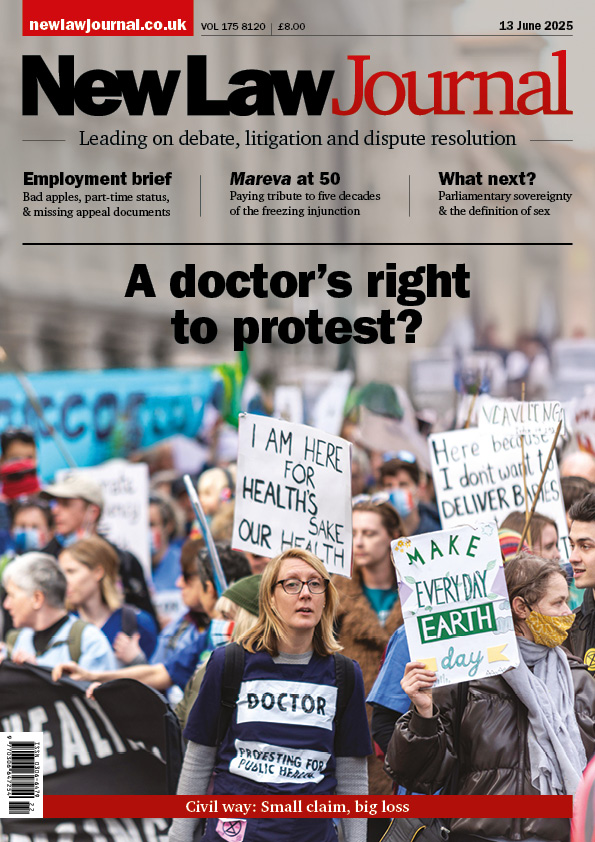THIS ISSUE

In recent years, the court have ‘displayed more willingness’ to recognise the concept of a duty of good faith in contractual disputes, Abdulali Jiwaji, partner at Signature Litigation, writes in this week’s NLJ. The Supreme Court’s ruling in Braganza has also influenced contractual interpretation, requiring discretionary decisions under contracts to be rational, honest and not arbitrary
Ian Smith chews over a bad apple, part-time status, missing appeal documents & whistleblowing detriments
Amy Woolfson analyses the legal position of healthcare professionals who take part in climate activism
Is there such a thing as a ‘bad apple’ principle in employment law? In this week’s NLJ, Ian Smith, barrister, emeritus professor of employment law at the Norwich Law School, UEA, covers four recent, important cases of value for practitioners
Wording of a deadline; a new type of law firm; the route to an intermediary; small claim: big loss.
Doctors with placards—what is the law? In this week’s NLJ, barrister Amy Woolfson, of 5 St Andrew’s Hill, analyses the legal position where healthcare professionals take part in climate activism
Trans rights in the aftermath of the recent Supreme Court judgment is a complex and sensitive area. In this week’s NLJ, Dr Graham Zellick KC, emeritus professor of law and former vice-chancellor of the University of London, reflects on the Supreme Court’s decision in For Women Scotland, the wider societal context behind the decision and the limited powers of the Gender Recognition Act 2004, under which gender recognition certificates are issued
The collapsing criminal justice system might return proportionality to health & safety enforcement decisions, argue Tom McNeill & Olivia Dwan
What impact will artificial intelligence (AI) have on our jobs? How will it shape the delivery of legal services? In this week’s NLJ, Bernadette Bulacan, chief evangelist, Icertis, writes that ‘the legal industry stands at a pivotal moment for transformation’ as gen AI, autonomous agents and large language models begin ‘reshaping how legal teams operate'
MOVERS & SHAKERS

Freeths—Ruth Clare
National real estate team bolstered by partner hire in Manchester

Farrer & Co—Claire Gordon
Partner appointed head of family team

mfg Solicitors—Neil Harrison
Firm strengthens agriculture and rural affairs team with partner return
NEWS
Conveyancing lawyers have enjoyed a rapid win after campaigning against UK Finance’s decision to charge for access to the Mortgage Lenders’ Handbook
The Crown Prosecution Service (CPS) has launched a recruitment drive for talented early career and more senior barristers and solicitors
Regulators differed in the clarity and consistency of their post-Mazur advice and guidance, according to an interim report by the Legal Services Board (LSB)
The Solicitors Act 1974 may still underpin legal regulation, but its age is increasingly showing. Writing in NLJ this week, Victoria Morrison-Hughes of the Association of Costs Lawyers argues that the Act is ‘out of step with modern consumer law’ and actively deters fairness
A Competition Appeal Tribunal (CAT) ruling has reopened debate on the availability of ‘user damages’ in competition claims. Writing in NLJ this week, Edward Nyman of Hausfeld explains how the CAT allowed Dr Liza Lovdahl Gormsen’s alternative damages case against Meta to proceed, rejecting arguments that such damages are barred in competition law







